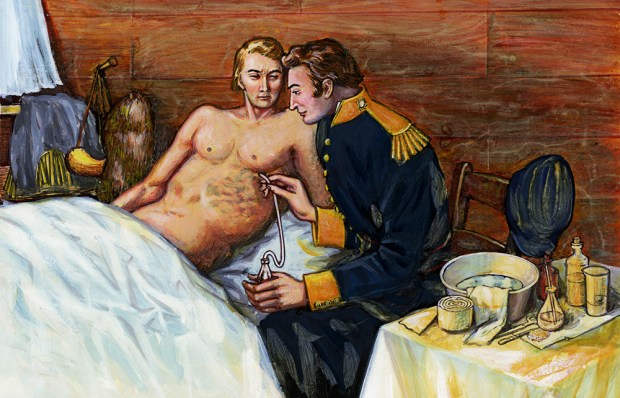Edmund White’s new novel opens, somewhat improbably, in 2050. This imagined future, however, springs few surprises on the reader and is in fact almost identical to the present. Indeed, the leap forward in time is merely a narrative device, allowing a 70-year-old Sicilian aristocrat to reminisce about his affair 30 years earlier with the elderly Edmund White, now long dead and more or less forgotten as a writer. Ruggero Castelnuovo has subsequently married a much younger American woman, Constance. The couple have made a pact never to talk about their past lives, but they now decide to write their private ‘confessions’, and much of the book is taken up with these largely sexual memoirs, sections of which they read aloud to each other.
Ruggero is an unrepentant ‘happy narcissist’, very handsome, beautifully mannered and reliably aroused by those who worship his physical endowments. This becomes essential when, after numerous relationships with both men and women, recounted here at length and in considerable detail, he meets the obese, impotent and partially disabled White, ‘a fat, famous slug’ very far from his physical ideal.
Ruggero is initially drawn to White’s books — ‘You’re the great artist who moved me to tears with his writing and the truth of his words’ — but he then embarks on a physical relationship with the sexually abject (and married) author, the details of which will be familiar to readers of the notorious ‘My Masters’ chapter of White’s 2005 memoir My Lives. Despite White being ‘the love of his life’, Ruggero eventually abandons him for a younger man, behaviour that makes Constance live in fear of being abandoned in her turn.
As is often the case with White, the principal characters may be indefatigably horny, but they are also undeniably classy. When Ruggero is 14 and enjoying al fresco mutual masturbation with his male cousin, he summons up the shade of Theocritus. He has, after all, been translating poems from the Greek Anthology into Italian for some time, as well as writing his own poems in Latin.
In addition to his ‘shockingly deep knowledge of the classics’, Ruggero has a precocious talent for music, which finds him playing ‘a simple piece by Kuhnau, Bach’s predecessor at Leipzig’, on a keyboard he has cut out of paper aged ‘six or seven’. He studies philosophy but eventually becomes a world-famous harpsichordist, whose fingers, when not running up and down a keyboard, tend to be probing the assorted orifices of his lovers. White nevertheless insists that he will immortalise Ruggero as ‘the handsome and devoted Ranieri to [my] melancholy, deformed Leopardi’.
The novel manages to be at once preposterous and engaging and is, as one would expect, elegantly written, with a wealth of lively, original and arresting images. It is at its most involving when Ruggero and Constance are swapping and commenting on their memories. When they part, the narrative focuses on the relationship between Ruggero and White, which Constance decides to research and write about after White’s death. Doubts are raised as to the veracity of the two men’s differing versions of the affair and its ending, and White has a good deal of masochistic fun — which is shared by the reader — in trashing his own character and literary reputation.
One does not, however, quite believe in the more rancid aspects of this self-portrait, entertaining as it is, and it could be said that self-involvement in its various forms is as much a theme of this wayward but enjoyable novel as ‘physical beauty and its inevitable decline’.
Got something to add? Join the discussion and comment below.
Get 10 issues for just $10
Subscribe to The Spectator Australia today for the next 10 magazine issues, plus full online access, for just $10.
You might disagree with half of it, but you’ll enjoy reading all of it. Try your first month for free, then just $2 a week for the remainder of your first year.














Comments
Don't miss out
Join the conversation with other Spectator Australia readers. Subscribe to leave a comment.
SUBSCRIBEAlready a subscriber? Log in